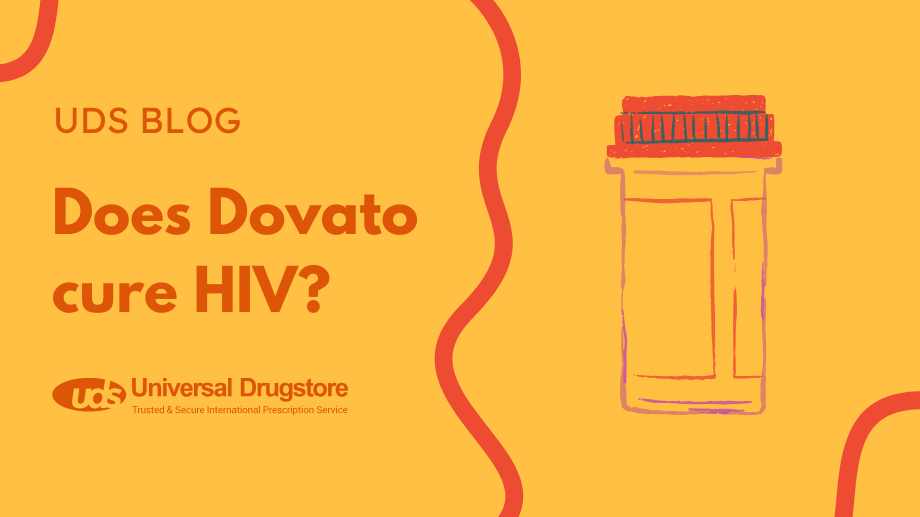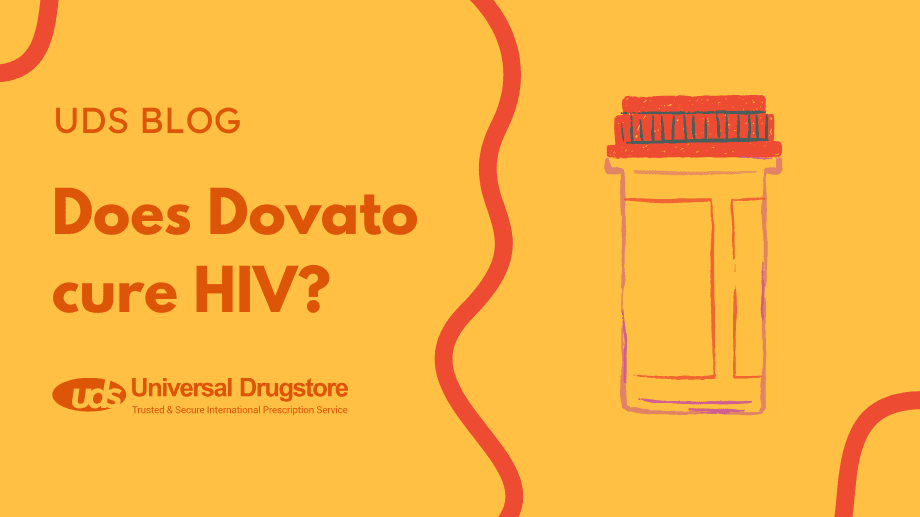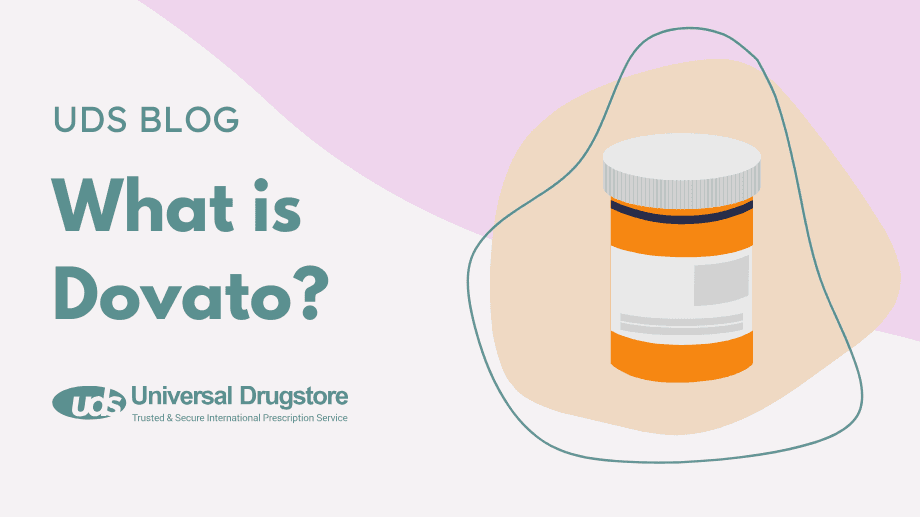Does Dovato cure HIV?

Human immunodeficiency virus (HIV), if left untreated can lead to serious complications, including acquired immunodeficiency syndrome (AIDS). While there are many options to treat HIV, none of these drug regimens cure HIV. However, HIV medications such as Dovato (dolutegravir/lamivudine) do work to reduce your viral load. This measures the amount of HIV that is present in your blood. The goal of HIV treatment is to get your viral load undetectable. This means the amount of HIV in your blood is below the level that a lab test can measure. Achieving an undetectable viral load will take time. Taking Dovato to achieve and maintain an undetectable viral load for at least 6 months helps prevent you from spreading HIV through sex. You should have your viral load measured regularly to confirm HIV remains at an undetectable level. Even if you are undetectable, you should still practice safe sex. Condoms can prevent other sexually transmitted infections (STIs) and pregnancy.
What else should you know while taking Dovato? Keep reading to find out.
Dovato FAQs
What does Dovato treat?
Dovato is a medication manufactured by Viiv Healthcare that combines dolutegravir and lamivudine. It is approved by the FDA for the treatment of HIV-1 infection if you have had no previous HIV-1 treatment or as a replacement for your current HIV-1 treatment if you have an undetectable level of HIV in your blood.
How does Dovato work?
Dovato contains a nucleoside reverse transcriptase inhibitor (NRTI), lamivudine, and an integrase inhibitor, dolutegravir. Dolutegravir treats your HIV infection by blocking an enzyme called integrase to stop the virus from making copies of itself. This prevents the virus from spreading throughout your body. Lamivudine also stops the virus from making copies of itself but works by blocking an enzyme called reverse transcriptase.
What are the possible side effects of Dovato?
The most common side effects of Dovato in clinical trials include:
- Headache
- Weight gain
- Nausea
- Diarrhea
- Trouble sleeping
- Tiredness
- Anxiety
Some other possible side effects of Dovato include:
- Increased blood sugar levels
- Decreased phosphate levels
- Increased creatine kinase levels in the blood
- Increased lipase levels
- Abnormal liver labs
- Dizziness
- Stomach pain
- Vomiting
- Gas
- Feeling depressed
- Strange dreams
Dovato may also cause more serious side effects including:
- Serious, sometimes life-threatening allergic reactions, with symptoms such as:
- Hives
- Swelling of your throat and tongue
- Trouble breathing
- Blisters or sores in your mouth
- Blistering or peeling skin
- General ill feeling
- Worsening hepatitis B virus (HBV)
If you have HBV, taking Dovato can make it harder to treat. Before you start taking Dovato, your healthcare provider will test you for HBV. If you test positive for HBV, you should be treated for both HIV and HBV.
If you have HBV, suddenly stopping Dovato can also cause an HBV flare-up. Do not stop taking Dovato unless your healthcare provider tells you to. If you need to stop taking this medication, your healthcare provider will order blood work to check for an HBV flare-up for several months after you stop Dovato.
Liver problems
Rarely, people taking medications that contain dolutegravir, such as Dovato, can experience severe liver problems. This is more common if you also have hepatitis B or hepatitis C. Be sure your healthcare provider is aware of your medical conditions before starting Dovato.
You should have regular blood tests while on Dovato to monitor your liver function. If you notice signs and symptoms of liver problems, such as upper right stomach pain, loss of appetite, yellowing of your skin or whites of your eyes (jaundice), or dark urine, notify your healthcare provider immediately.
Lactic acidosis
Dovato can also rarely cause a build-up of lactic acid in your blood. This can be very serious if left untreated. Let your healthcare provider know right away if you experience symptoms of lactic acidosis, including feeling weak, muscle pain, and trouble breathing.
Immune reconstitution
When you start Dovato, your immune system can become overactive. Rarely, it may start to attack normal cells in your body (autoimmune). You may develop immune reconstitution syndrome within the first few weeks of Dovato treatment or many months later. Notify your healthcare provider immediately if you start having any new symptoms, such as fever, pain, hair loss, bulging eyes, or sweating, after starting Dovato.
Harm to your unborn baby
Taking Dovato early in your pregnancy may raise the risk of birth defects called neural tube defects. Because of this risk, your healthcare provider may ask you to take a pregnancy test before starting Dovato if you can become pregnant. You should also discuss birth control options with them while you are taking Dovato. You may be able to take Dovato in the second and third trimesters of pregnancy, but only if the benefit is greater than the risk of harm to your unborn baby. If you are pregnant or plan on becoming pregnant, discuss your HIV treatment options with your healthcare provider.
Shop Medications
These are not all of the possible adverse events of Dovato. You should always seek medical advice from a healthcare professional for any questions or concerns about your medical condition or treatment. You should also read all the patient information, including your Medication Guide that comes with Dovato. You can report side effects to the FDA at 1-800-FDA-1088 or www.fda.gov/medwatch.
What warnings are there with Dovato?
The FDA has Boxed Warnings about the worsening of an existing hepatitis B infection or becoming resistant to one of the medications in Dovato.
You should be tested for hepatitis B virus (HBV) before beginning Dovato treatment. Using medications such as Dovato that contain lamivudine, when you have both HIV-1 and HBV can cause your HBV to become resistant to lamivudine. This may make HBV harder to treat. Your healthcare provider may consider giving you additional treatment for HBV or choose an alternative regimen for HIV-1.
Also, if you have HIV-1 and HBV, stopping treatment with medications such as Dovato that contain lamivudine, may worsen HBV. Your liver function should be monitored and treatment for HBV started if needed.
What should you tell your healthcare provider before taking Dovato?
You should avoid this medication if you are allergic to dolutegravir, lamivudine, or any inactive ingredient in this product. You should not take Dovato if you are currently taking a medication called dofetilide.
Be sure your healthcare provider is aware of all your medical conditions as they may be contraindications or you may need increased monitoring during treatment, including if you:
- Have or have had liver disease, including hepatitis B or hepatitis C infection
- Have kidney problems
- Have a medical condition where you have to take carbamazepine or rifampin
- Are pregnant or plan on becoming pregnant
- Are breastfeeding or plan on breastfeeding
Does Dovato interact with other drugs you are taking?
When Dovato is taken with other prescription drugs, over-the-counter medications, vitamins, herbal products, and supplements, it may change how they work or increase the risk of side effects. Be sure to tell your healthcare provider about all your current medications so they can determine if there are any drug interactions. This includes:
- Other antiretroviral medications
- Antacids or laxatives that contain calcium, magnesium, or aluminum
- Iron supplements
- Dofetilide
- Dalfampridine
- Metformin
- Carbamazepine
- Oxcarbazepine
- Phenytoin
- Phenobarbital
- St. John’s Wort
- Sorbitol
- Rifampin
What is the success rate of Dovato?
Dovato was shown to be effective at achieving or keeping the viral load undetectable in several clinical trials. For patients that were already being treated, less than 1% had a detectable viral load (50 or more copies per mL) after 1 year when switched to Dovato. There were similar results after 3 years. Also, during the 3 years of clinical trials, no patients who switched to Dovato developed HIV resistance.
For patients with no previous antiretroviral treatment, two combined studies proved that Dovato was as effective in helping them reach and stay undetectable (less than 50 copies per mL) as effectively as a drug regimen containing 3 medicines. After 48 weeks, the success rate was 91% in the group receiving lamivudine/dolutegravir. The majority of these patients had similar results after 3 years.
Can Dovato completely eliminate HIV from the body?
No, Dovato will not eliminate or cure HIV. However, it has been proven to keep HIV levels (viral load) undetectable in the majority of people taking it. Keeping your viral load undetectable can help prevent complications as well as stop the spread of HIV to other people.
Does Dovato prevent the spread of HIV?
Yes, taking Dovato every day to get to and stay undetectable for at least 6 months can prevent the transmission of HIV through sex. Viral load testing should be performed regularly to ensure HIV levels remain undetectable. However, you should still practice safe sex as Dovato will not prevent pregnancy or other sexually transmitted infections (STIs).
Does Dovato cause weight gain?
Yes, some people who took Dovato to treat HIV gained weight while on this medication. In one clinical trial, 3% of those taking Dovato saw an increase in weight. It should be noted that weight gain is fairly common in people starting HIV medications. It is not known if this weight gain is due to an improvement in health with HIV treatment or is a side effect of the medications. Talk with your healthcare provider about a weight management plan that is right for you if you notice significant weight gain while taking Dovato.
Related Medications
- Truvada (emtricitabine/tenofovir disoproxil fumarate)
- Descovy (emtricitabine/tenofovir alafenamide fumarate)
- Genvoya (elvitegravir/cobicistat/emtricitabine/tenofovir alafenamide fumarate)
- Biktarvy (bictegravir/emtricitabine/tenofovir alafenamide fumarate)
- Triumeq (abacavir/dolutegravir/lamivudine)
- Stribild (elvitegravir/cobicistat/emtricitabine/tenofovir disoproxil fumarate)





